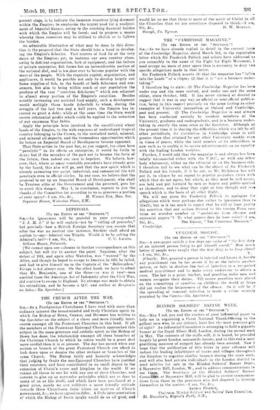THE "CAMBRIDGE MAGAZINE."
(To THE EDITOR OF THE " SPECTATOR.") SIR,—As we have already replied in detail in the current issue of the Cambridge Magazine, dated March 3rd, to the regrettable letter which Sir Frederick Pollock and others have addressed to you ostensibly in the name of the Fight for Eight Movement, I need occupy no more of your space than is necessary to deny two specific allegations made in that letter.
Sir Frederick Pollock asserts (1) that the magazine has "fallen into the hands " of a clique; (2) that it is "not a business under- taking."
I therefore beg to state : (1) The Cambridge Magazine has been under one and the same control, and under one and the same editor, since October, 1912. It has never claimed or desired to suggest that it was in any way an official or semi-official publica- tion, being in this respect precisely on the same footing as other examples of University journalism at Oxford and Cambridge, past and present. (2) The Cambridge Magazine is and always has been conducted entirely by resident members of the University, graduate and undergraduate, and is a business under- taking in exactly the same sense as the Spectator. Although at the present time it is sharing the difficulties which are felt by all other periodicals, its circulation in Cambridge alone is still greater than that attained by any other University weekly, even in times of peace; while the total number of its subscribers is now such as to enable it to secure advertisements on au equality with the leading London weeklies.
Further, I would add that the magazine is and always hag bees totally unconnected either with the U.D.C., or with any other body whatsoever, either on the editorial or on the business side. I therefore fail to see what can be the object of Sir Frederick Pollock and his friends, if it be not, as Mr. Dickinson has well put it, to silence by all appeal to popular prejudice views with which they do not agree, but which, as they must be well aware, are held and put forward by men as honest and public-spirited as themselves, and to deny that right of free thought and free speech which is the basis of all other Right.
We will not press Sir Frederiek Pollock to apologize fur allegations which were perhaps due rather to ignorance than to illwill; but is it too much to expect that he will at least justify his assertion that our section devoted to the foreign Press con- tains an overdue number of "quotations from obscure and extremist papers "? To what papers does he here refer?—I


































 Previous page
Previous page